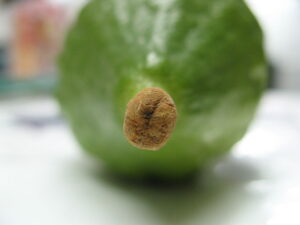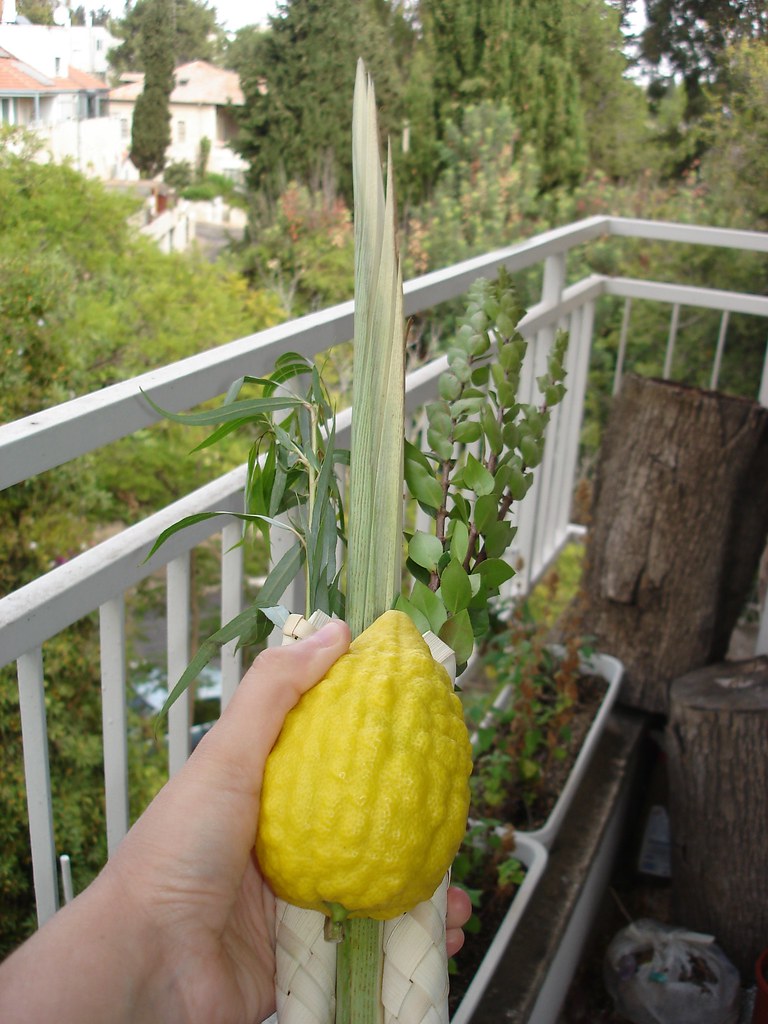| Source (German) | Translation (English) |
|---|---|
Wenn eine Frau den stiel vom Esrog ausbeißt.[1] Es ist an manchen Orten noch gebräuchlich, an diesem Tage schwangern Frauen den sogenannten Paradiesäpfel zu schicken, damit sie den Stiel ausbrißen. Ich habe über diesen Gegenstand ein Gebet gefunden, und durfte nicht unterlassen, hier ebensalls ein solches aufzunehmen. |
When a woman bites the pitom from the etrog.[2] It is still customary in some places to send pregnant women the so-called apple of paradise on this day, so that they will bite out the pitom. I have found a prayer about this item, and could not refrain from including one here as well. |
Herr der Welt! unsere Stammmutter Eva hat, überredet von der Schlange, im Paradiese sich verleiten lassen, dein Gebot zu übertreten, und hat dadurch über sich und über ihren Mann Elend gebracht. Mannigfache Schmerzen waren seitdem ihr Loos, die sie auf ihre Nachkommen vererbt hat. Wir alle stehen in Gefahr von der Schlange unfrer Sinnlichkeit zu Uebertretung der göttlichen Gebote verleitet zu werden. |
Lord of the world! Our ancestress Eve, persuaded by the serpent, allowed herself to be tempted in paradise to transgress your commandment, and thereby brought misery upon herself and upon her husband. Manifold pains have been her lot since then, which she has passed on to her descendants. We are all in danger of being tempted by the serpent of sensuality to transgress the divine commandments. |
Gieb, o Gott, daß wir genug stark sein mögen, keiner verführerischen Stimme unser Ohr zu leihen, und daß wir nie vergessen, daß dem Uebertreter deiner Gebote das Paradies der Unschuld sich auf Ewig verschließt, wie es sich vor Eva verschlossen hat. Und dein Rache-Engel, das Gewissen, mit dem flammenden Schwerdte, der schmerzlichen Erinnerung, verschließt uns auf ewig das Thor des Paradieses. |
Grant, O God, that we may be strong enough not to lend our ear to any seductive voice, and that we never forget that the paradise of innocence closes forever to the transgressor of your commandments, as it closed itself to Eve. And your avenging angel, the conscience, with the flaming sword, the painful memory, closes the gate of paradise for us forever. |
Wie ich in sieben Festtagen kein Gelüste nach dieser Frucht, die wir Paradießapfel nennen, gehabt habe; und so wenig Genuß mir das Ausbeißen ihres Stiels gewährt, so laß mich frei sein von jeder Begierlichkeit und Lüsternheir, und nie möge ich die Freuden suchen, die das Laster gewährt. Ich wandle in Unschuld und du erlösest mich und bist mir gnädig. Amen. |
As I have had no desire for this fruit, which we call the apple of paradise, in seven feast days; and as little pleasure the biting of its stalk affords me, let me be free from all covetousness and lechery, and never may I seek the pleasures which vice affords. I walk in innocence and you redeem me and are merciful to me. Amen. |
“Wenn eine Frau den stiel vom Esrog ausbeißt” was written by Yehoshua Heshil Miro and published in his anthology of teḥinot, בית יעקב (Beit Yaaqov) Allgemeines Gebetbuch für gebildete Frauen mosaischer Religion. In the original 1829 edition, תחנות Teḥinot ein Gebetbuch für gebildete Frauenzimmer mosaischer Religion, it appears as teḥinah №51, on pp. 73-74. In the 1835 edition, it appears as teḥinah №52, on pp. 91-92. In the 1842 edition, it appears as teḥinah №55, on pp. 96-97.
This transcription was derived by proofreading the output of Tesseract-OCR with its Fraktur script training data. This translation was derived by proofreading the output of the translation tools of DeepL and Google. –Aharon Varady
Source(s)


Notes
| 1 | Es ist an manchen Orten noch gebräuchlich, an diesem Tage schwangern Frauen den sogenannten Paradiesäpfel zu schicken, damit sie den Stiel ausbrißen. Ich habe über diesen Gegenstand ein Gebet gefunden, und durfte nicht unterlassen, hier ebensalls ein solches aufzunehmen. |
|---|---|
| 2 | It is still customary in some places to send pregnant women the so-called apple of paradise on this day, so that they will bite out the pitom. I have found a prayer about this item, and could not refrain from including one here as well. |

“Wenn eine Frau den stiel vom Esrog ausbeißt | When a woman bites the pitom from the etrog, by Yehoshua Heshil Miro (1829)” is shared through the Open Siddur Project with a Creative Commons Attribution-ShareAlike 4.0 International copyleft license.










Leave a Reply